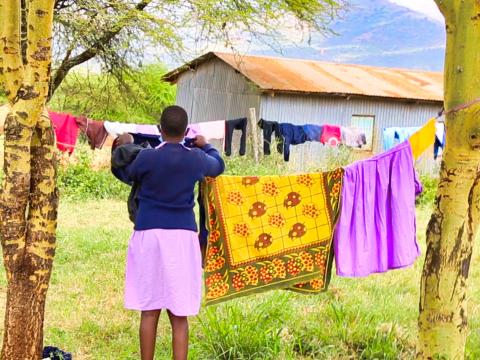Breaking Free from Child Marriage and Embracing Hope

By Felix Pilipili, Communications Specialist, World Vision Kenya
13-year-old Naomi (not her real name) was born in a village in Osiligi, Kajiado County, Kenya. This area is predominantly inhabited by the Maasai community, who have traditionally led a nomadic pastoralist lifestyle, relying on cattle and goats as their primary sources of food and income.
The Maasai community takes immense pride in preserving their culture, but unfortunately, some of these traditions can be harmful to girls. Specifically, practices such as Female Genital Mutilation (FGM), child marriage, and teenage pregnancy have serious lifelong health implications on girls. Moreover, they often result in the premature end of a girl's education, depriving them of future opportunities and leaving them vulnerable to exploitation and abuse.
Many boys also leave school early because, once they are considered “men”, gender norms dictate that they should not receive instruction from female teachers.
Naomi grew up in this challenging environment, raised in a pastoralist family where it was often difficult to secure enough food. Despite the hardships, she enjoyed her childhood. However, she was denied access to education simply because she was a "girl."
"This is not the kind of life I envisioned. Like other children, my dream was to grow up in a safe environment where I could attend school, learn, and play with my peers," she shares.
Naomi deeply regrets that her community continues to embrace regressive cultural beliefs even in today's modern age. These beliefs have shattered the dreams of many girls in her community. "It pains me to see that girls in my community were viewed as sources of wealth for the family. While boys were sent to school, girls were confined to their homes, tending to goats and cattle until the age of 9, when they were married off."
At the tender age of 8, Naomi was introduced to her "husband-to-be," who arrived at their home late in the evening. Little did she know that this night would mark the beginning of her journey into an early marriage.
She recounted her harrowing experience, saying, "My father conspired with other elders to arrange my marriage, despite my mother's objections. Her efforts to secretly aid my escape from home proved futile, as even the local authorities did not provide assistance." She continued, "On that fateful night, my prospective husband stayed over at our house, and the following morning, he forcibly transported me to an unfamiliar location on his motorcycle."
Naomi embarked on a new chapter in her life by assuming the role of a wife at the tender age of eight. She explained, "My responsibilities included tending to cattle, goats, and fetching water while my husband was away for work. Additionally, I had to live under the same roof as my mother-in-law. Fortunately, I never had to share a bed with my husband!"
Two weeks later, while performing her usual duties of tending to goats, Naomi encountered a 12-year-old girl in the village whose parents were also in the process of arranging her marriage. The bride price had already been negotiated, and all the marriage arrangements were finalised. Fortunately, Naomi's friend was aware of a rescue centre where they could seek assistance. The two girls had a conversation, during which Naomi's friend asked her if she wanted to go through with the marriage.
The following day, the girl attended school and reported their child marriage cases to a World Vision volunteer. The authorities took swift action, and both girls were transported to the rescue centre which serves as a home for children who cannot remain with their families and is located adjacent to the local school. While the government manages the rescue centre, World Vision sponsorship plays a crucial role by providing psychosocial support and trauma recovery assistance to sponsored and other children residing there, in addition to helping them understand their rights.
Now at the age of 13, Naomi has resided at the rescue centre for five years and has not seen her family since. She shares, "I feel happy, safe, and well-cared for in my new home. The matron takes good care of us, ensuring we have an ample supply of food and essential items such as sanitary pads."
Naomi aspires to become a successful accountant after completing her education, and to establish a rescue centre for both boys and girls who may encounter similar challenges in life.